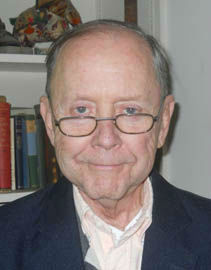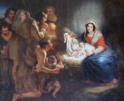
Culture
Except for narrator Nick Carraway, a classmate of Buchanan at Yale, the only decent person in the story is Gatsby, whom Fitzgerald (a Princeton man) depicts as an innocent adrift in a sea of venality.

Shaw
Several miles outside Washington, DC, in a bustling Maryland suburb called Rockville, there's a small cemetery next to a Catholic church. In it is a headstone bearing two names: Francis Scott Key Fitzgerald and Zelda Sayre. This is the final resting place of novelist F. Scott Fitzgerald and his wife.
Years ago, it seems, there was a bit of a fuss about having them in a Catholic cemetery since Fitzgerald, although raised a Catholic, hadn't practiced his religion and led a famously disorderly life. The issue was ultimately settled by Cardinal William Baum, then Archbishop of Washington, who gave his approval and said of the famous author that the characters in his stories are "involved in this great drama, seeking God and seeking grace."
That surely was a lovely tribute, but it's a stretch to see how it applies to Fitzgerald's best-known novel, "The Great Gatsby." Originally published in 1925, the book deserves serious reflection now as its hundredth anniversary year approaches.
Writing in The Paris Review, critic Wesley Morris remarks on "the brutal awfulness of nearly every person" in the story with the sole exception of the title character. The intricately imagined plot focuses on Jay Gatsby's doomed pursuit of Daisy Buchanan, a supremely self-centered high society beauty with whom Gatsby fell hopelessly in love before going overseas as a second lieutenant in World War I.
Returning after the war, Gatsby finds her married to a wealthy lout named Tom Buchanan. Gatsby acquires wealth himself (apparently by bootlegging -- this was the era of Prohibition, after all) and sets out after Daisy, whom he traces to the Buchanan estate on Long Island. And there the tragic story plays itself out amid the mansions of the rich.
Except for narrator Nick Carraway, a classmate of Buchanan at Yale, the only decent person in the story is Gatsby, whom Fitzgerald (a Princeton man) depicts as an innocent adrift in a sea of venality.
This is required by the moral Fitzgerald is preaching. For, strange to say, "The Great Gatsby" is a morality tale, driven by the contrast between the fundamental goodness of Gatsby and the cold self-seeking of the Buchanans -- a trait shared by the parasitic bottom feeders who, with or without invitations, throng Gatsby's lavish parties (which the host himself shuns) while drinking his bootleg liquor and gossiping about him.
"The Great Gatsby" is probably best known for its picture of the Roaring '20s. But there's something else here. For the fundamental moral of this morality tale concerns the tension between the innocence of the American West, site of Gatsby's humble origins, and the cynicism of the East Coast, embodied in the heartless Buchanans -- especially beautiful Daisy -- along with as Gatsby's hangers-on.
F. Scott Fitzgerald died in 1940 at 44. Zelda died in 1948 at 47, having perished in a fire in the institution for the mentally ill where she lived for many years. Their burial in the cemetery of St. Mary's Church reflects the fact that Fitzgeralds of earlier days farmed the surrounding fields -- then far removed from the city back -- and Scott expressed a wish to be buried near his ancestors.
At story's end Carraway reflects that although Gatsby trusted in the future, that was his mistake, since his future was "already behind him" before he died. "The Great Gatsby" accordingly closes with now-famous lines that now appear on Scott and Zelda's headstone: "So we beat on, boats against the current, borne ceaselessly into the past." God grant rest to their troubled souls.
- Russell Shaw is the author of more than twenty books. He is a consultor of the Pontifical Council for Social Communications and served as communications director for the U.S. Bishops.
Recent articles in the Culture & Events section
-
Happy New Year!Eileen McLaughlin
-
Joyful hopeMichael Reardon
-
Scripture Reflection for Jan. 5, 2025, The Epiphany of the LordDeacon Greg Kandra
-
Tolkien's world, still popular on the big screen, began with faith and wordsCecilia Hadley
-
Scripture Reflection for Dec. 22, 2024, Fourth Sunday of AdventDeacon Greg Kandra























